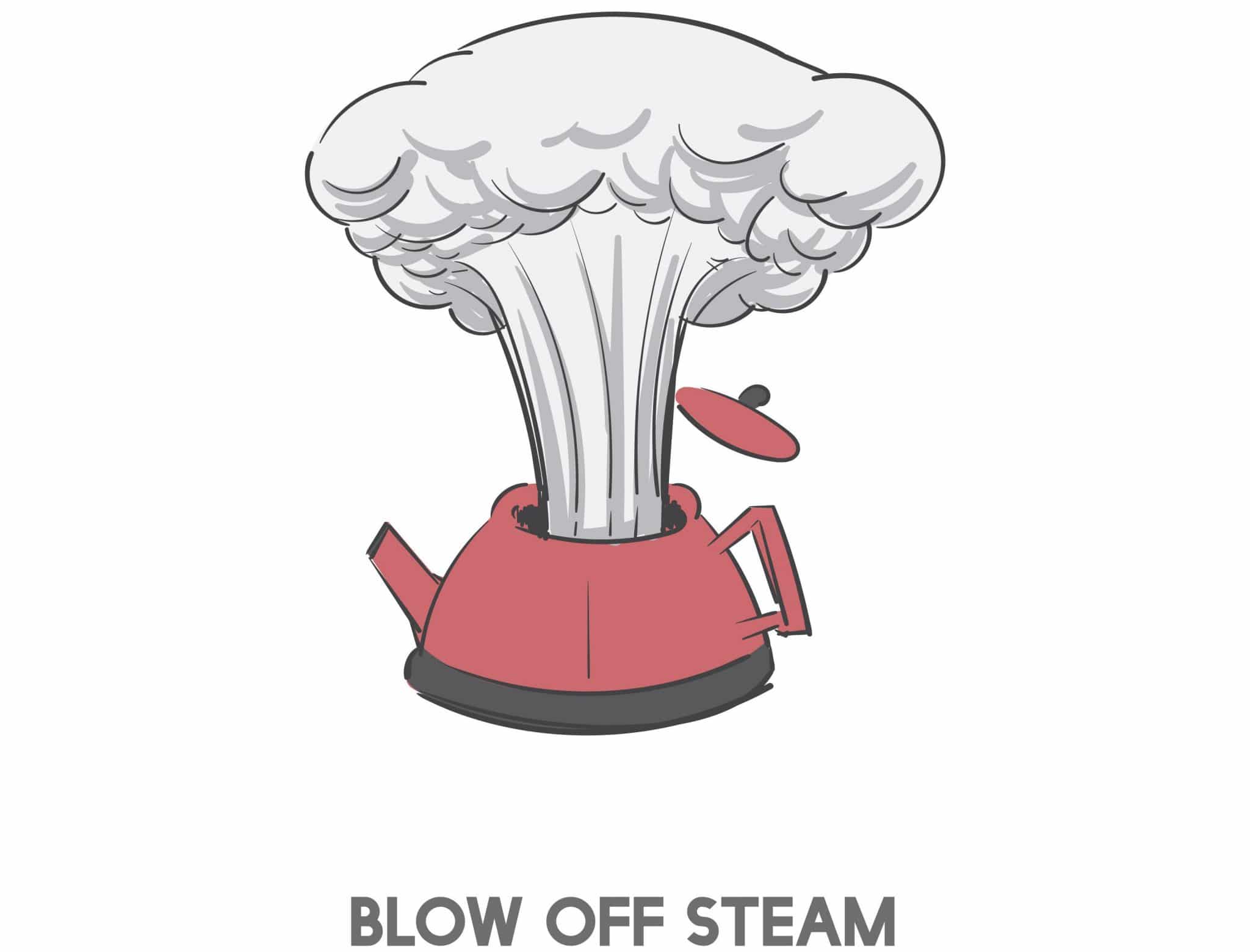Using idiomatic expressions is fun when you clearly understand how to use them correctly. The idiom “blow off steam” is quite easy to use as long as you have comprehensive knowledge of it.
The idiom “blow off steam” means saying or doing something that helps you relax after doing a hard job and gets rid of any strong feeling or energy that is not required. For example, Joanna decided to blow off some steam after work by going to the spa.
From the definition above, you can see that the idiom “blow off steam” is not difficult to use; however, you cannot understand the totality of an idiom from a meaning. We will be explaining everything you need to understand about the idiom before you can use it when writing.
What Does “Blow Off Steam” Mean?

Using idiomatic expressions without at least having a basic understanding of them will only result in confusion and communication barriers; your writing will not be understood by anyone who reads it.
There are lots of meanings to the idiom “blow off steam.” We will be exploring these meanings so that you can have a better understanding and know when and how to use the idiom “blow off steam.”
The idiom “blow off steam” means relieving yourself of a feeling or emotion that has been suppressed for a long time by engaging in any vigorous activity or by shouting, screaming, and engaging in loud talk.
It also means doing something you enjoy or something that keeps you relaxed because you want to release some strong energy and emotions that you have been harboring. It can also refer to engaging in activities that make you feel relaxed after a stressful day.
The idiom “blow off steam” also means letting out a feeling of frustration or anger by shouting or screaming at someone because you are no longer willing to feel that emotion, and you are ready to release it.
It also means to play or work off the energy that is not required by your body. This definition applies to children. The idiom “blow off steam” can also refer to a way of relieving yourself from a feeling of tension, stress, anger, and any other unwanted strong energy.
Another meaning of the idiom “blow off steam” is to get out an unwanted feeling, especially one caused by frustration. You get it out by talking in a very loud manner or by complaining to someone about it.
The idiom “blow off steam” also means shouting, ranting, or venting to make your feelings known and also to relieve yourself of stress.
What Is The Origin Of The Idiomatic Expression “Blow Off Steam”?

The idiom “blow off steam” was first used in the 1800s. It originated from the use of old steam boilers. In those days, ships, cars, locomotives, and other heating systems require steam to function, and the steam engine was invented.
Water was heated in a boiler to produce steam which produces pressure that makes cars, locomotives, and ships move. The only problem was that the steam often produced more pressure than required, so it would explode when the boiler was overfilled.
So, most of the boilers used were equipped with a special pressure valve so that when there is excess pressure, the valves open up to release the steam, which prevents the boiler from exploding.
The valves were commonly referred to as ‘blow off’ valves because they blow off steam and reduce pressure. Thus, the idiom “blow off steam” came to be used as a result of this incident.
There are other theories as to how the expression came to be. Some say it originated from the early days of railroading. Most locomotives used during those days were without safety valves, so when there is excess steam pressure, the engineer of that locomotive will pull a lever that will blow off steam to prevent an explosion.
How Do People Use The Idiomatic Expression “Blow Off Steam”?

Now that we have clarified the meaning and origin of the idiom “blow off steam,” we will discuss how and when to use the idiom correctly in a sentence.
You use the idiom “blow off steam” when you want to do something that keeps you calm and relaxed, especially if you have been going through a tough situation or when you have been over-stressed.
The idiom is also used when referring to someone who is lashing out as a result of the pent-up frustration or anger they have been harboring for a long time. For example, Anne was shouting at Adams, and Joshua told Adams not to worry that she was just blowing off some steam.
You can also use the idiom to describe a situation where you need to relieve yourself of excess energy by engaging in different activities. The idiom is also used to refer to a situation where you need to release your suppressed emotion.
>The idiom “blow off steam” is also used when you walk away to a quiet place after having a confrontation or argument with someone. You walk away to a quiet place to think or be alone because that argument has stressed you out. It is also used to express a feeling of frustration in a non-dangerous manner.
The idiom “blow off steam” is used in Northern American countries like the United States and Canada, while the British will say “let off steam.” However, they both have the same meaning. The expression “blow off some steam” is also used to replace the idiom “blow off steam” depending on the context of the statement made.
You can also use the idiom “blow off steam” when complaining or expressing a feeling of discontentment in a wearisome manner. You can also say “blowing off some steam” or “blowing off steam” in the present continuous tense.
There are other words and phrases similar in meaning to the idiom “blow off steam,” like speaking your mind, express yourself, let yourself go, get rid of excess energy, complain, be merry, fool around, communicate your thoughts, and release pent up energy.
Illustrative Examples Of How To Use The Idiomatic Expression
Now, we have a better understanding of how to use the idiom “blow off steam,” we will look at some illustrative examples to better understand the idiom.
- After a week of hard work at the office to secure a deal with a promising investor, our boss gave us two days off at intervals to blow off steam, and I decided to go fishing because it is one of my hobbies.
- When I came into the house, I found Lila shouting at Edward, who was trembling, so I went to him and told him not to worry because Lila was blowing off steam and was not angry with him.
- Justin and I were experiencing some difficulties on a project we were working on; after spending the whole week completing the project, we decided to visit the park to blow off steam.
- Elizabeth has been having problems with her husband lately, so she came to me and told me all about the fights they have been having. I gave her some advice and told her she can always call me when she needs to let off steam.
- When I got back from the office, I was so stressed. My husband took me to the spa to let off steam and instructed them to provide all stress-relieving treatments and procedures available.
- Everything was turning out wrong for me when I got to the office; it was like someone wished me bad luck. When I eventually got home, I needed to let off steam, so I took a warm bath and slept off immediately.
- At the health seminar in my school, the psychologist was speaking, and she mentioned something that caught my attention; she said that when you are angry or upset, you need to let off steam by doing something that keeps you relaxed.
- During the lecture today, everyone complained of how grumpy the lecturer was because he was punishing students for little mistakes, so a coursemate of mine shouted at him to blow off some steam somewhere else.
- James has been under much pressure lately; his parents were on him about his grades, and his football coach kept compelling him to play properly, so he decided to drive to another town to blow off steam because driving keeps him calm.
- When I got home, I found my parents arguing, and when I tried to step in, they turned on me and started shouting that I was the cause of their problem, so I left to change into my running clothes and went for a run to blow off steam.
More English Idioms
Final Thoughts
No matter how good you think you are with writing, lacking understanding of words and idioms will deter you from writing excellently. This is why you need to make time to study and acquire knowledge of words, idioms, phrases, and proverbs.
It is very difficult to find a good writer that does not take time to read, the only way to improve as a writer is by reading and applying what you have learned from your studies. So, read up and be knowledgeable.
Shawn Manaher is the founder and CEO of The Content Authority. He’s one part content manager, one part writing ninja organizer, and two parts leader of top content creators. You don’t even want to know what he calls pancakes.

